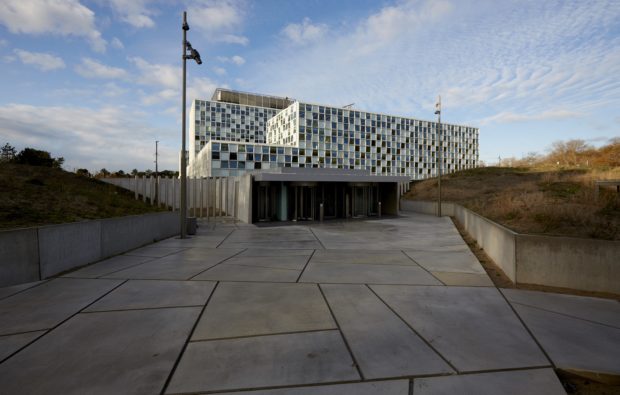No trial, arrest in sight yet despite ICC ruling

A picture taken on Nov. 23, 2015 shows the new building of the International Criminal Court (ICC) in The Hague, The Netherlands. (Photo by Martijn Beekman / ANP via Agence France-Presse)
MANILA, Philippines — The road to a trial — and the arrest of responsible officials — remains challenging despite the International Criminal Court’s (ICC) decision authorizing an investigation into the brutal drug war in the Philippines, according to legal experts familiar with The Hague-based tribunal’s processes.
The narrow 3-2 majority vote by the ICC’s Appeals Chamber, they said, may have opened a window for the Philippine government to challenge the court’s jurisdiction over the alleged crimes against humanity in the antidrug campaign waged by former President Rodrigo Duterte that left thousands dead.
This window comes in the form of the dissenting opinion by the presiding judge, Marc Perrin de Brichambaut of France, and Gocha Lordkipanidze of Georgia, who had voted to terminate the ICC investigation, international law professor Romel Bagares said in an interview on Wednesday.
But the two were outnumbered by Solomy Balungi Bossa of Uganda, Luz del Carmen Ibáñez Carranza of Peru, and Piotr Hofmański of Poland, who affirmed an earlier decision by the court’s Pre-Trial Chamber in January to allow an inquiry because of the Philippines’ reluctance to investigate or prosecute crimes related to the drug war.
“This is where you really have to credit the Office of the Solicitor General (OSG) lawyers because they managed to convince two judges,” said Bagares. “This decision and that dissent should give the government some comfort for engaging with the ICC.”
Article continues after this advertisementLast-minute argument
Brichambaut and Lordkipanidze were both persuaded by a last-minute argument of the Philippines that the court held no jurisdiction to investigate the alleged crimes.
Article continues after this advertisementThey agreed that Article 127 of the Rome Statute, the founding document of the ICC, should not be interpreted to extend the Office of the Prosecutor’s power to request an investigation even after a state had withdrawn from the statute.
This argument came late into the Philippines’ appeal and only after the OSG had hired British barrister Sarah Bafadhel of the United Kingdom-based 9BR Chambers as outside counsel.
At a press conference on Tuesday night with Filipino officials, Bafadhel said the Philippines may again raise the issue of jurisdiction should the ICC move for the arrest of individuals being linked to the drug war.
“The main opportunity would be in the event that the prosecution did issue an arrest warrant, name a specific suspect, and put forward a concrete case that the government, under Article 19 of the Rome Statute, has the right to intervene and ask for a decision on jurisdiction at that point, arguing and asserting that the court does not have jurisdiction,’’ she said.
Once the question of jurisdiction is raised by the parties, “the court will have to determine with more clarity what it means for a state party to withdraw and when their obligation to cooperate ends,” said International Center for Transitional Justice senior expert Ruben Carranza.
But such a move could jeopardize the suspects’ own case, he warned. “[They] also face the risk that, if their challenge is denied, then they have to resign [themselves] to the fact that if they appeared before the court, then they ought to continue appearing.”
‘Gaping hole’
Solicitor General Menardo Guevarra said the ICC chamber’s failure to rule on the jurisdiction issue was “a gaping hole” in the decision.
“The majority did not tackle it and the minority, including the presiding judge, took a strong position that the ICC had already lost jurisdiction over the Philippines when the ICC prosecutor sought to commence his investigation. This unresolved issue of jurisdiction will be a powerful argument for any person who may be investigated or charged by the ICC,” he said.
Guevarra reiterated that the Philippines “never accepted the court’s jurisdiction, whether expressly or impliedly, as we were very much aware that our withdrawal from the ICC had taken effect in 2019.”
In a statement, the Department of Justice echoed his position, saying the opinions of the dissenting judges “underscore the existence of a legitimate difference of legal interpretation, casting doubts on the majority’s ruling.”